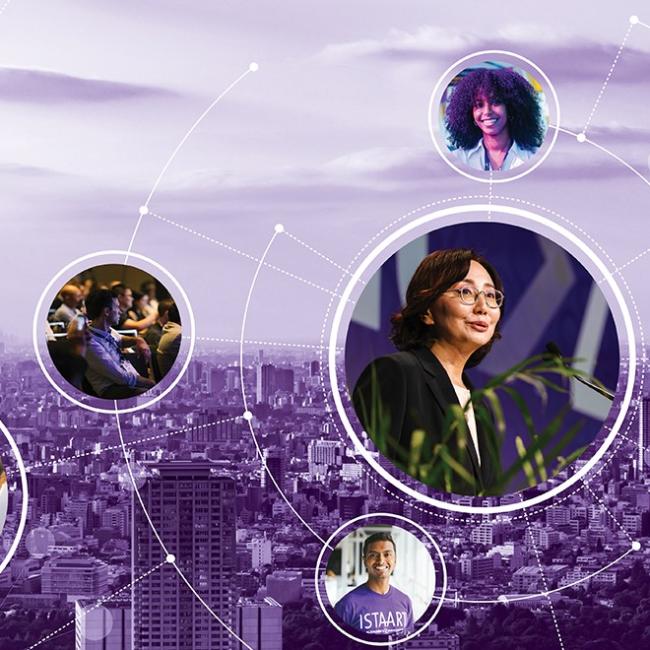Global Brain Health Leaders Convene in Lima, Peru for AAIC Satellite Symposium on Dementia Research and Innovation
Rooted in regional collaboration and global connection, the 2025 AAIC Satellite Symposium and GBHI Annual Conference in Lima gathered brain health experts to explore new frontiers in dementia prevention, care, and equity.
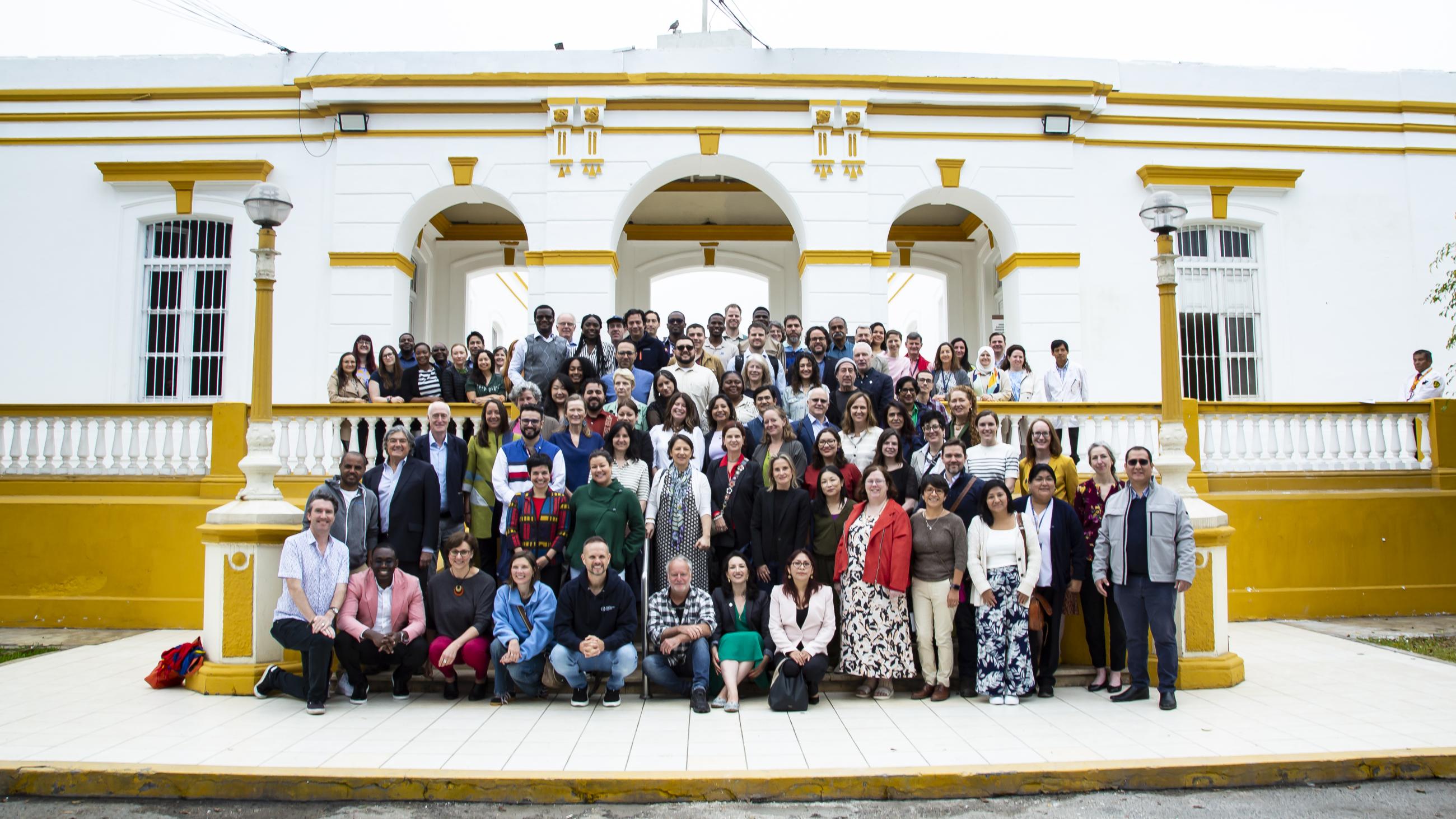
GBHI community members gathered outside Hospital Víctor Larco Herrera in Lima, Peru, during a public event on frontotemporal dementia as part of the 2025 GBHI Annual Conference. Photo credit: Mario Colón
Leading researchers, clinicians, and advocates from Latin America and around the world convened in person and online for the Alzheimer’s Association International Conference (AAIC) Satellite Symposium, held May 14–15 in Lima, Peru. Co-hosted by the Alzheimer’s Association and the Global Brain Health Institute (GBHI), this dynamic two-day event will spotlight the latest advances in dementia science and regionally driven approaches to care and prevention. The symposium brought together more than 600 participants from 63 countries, highlighting its truly global reach.
This marked the tenth AAIC Satellite Symposium hosted by the Alzheimer’s Association, and the sixth co-hosted with GBHI. These regional meetings bring key elements of the Alzheimer’s Association International Conference (AAIC) around the globe, invigorating international collaborations in countries including Mexico, Argentina, Bulgaria, India, Brazil, Australia and South Africa.
“By bringing together diverse perspectives and showcasing locally conducted research, the AAIC Satellite Symposium facilitates both local and international collaboration, and empowers researchers to address the unique cultural, demographic, and economic realities of their regions,” said Maria C. Carrillo, Alzheimer’s Association chief science officer and medical affairs lead. “We are proud to partner with GBHI to accelerate progress toward earlier diagnosis, equitable care, effective treatment, and ultimately a cure for Alzheimer’s and all other diseases that cause dementia.”
The symposium featured rich programming across a range of disciplines—from biomarkers and basic science to drug development, caregiving, public health and policy. Highlights included:
- A keynote honoring the legacy of Colombian neurologist Francisco Lopera delivered by Kenneth Kosik of UC Santa Barbara.
- Sessions led by GBHI faculty and Atlantic Fellows including Lea Grinberg on neuropathological comorbidities, Joaquín Migeot on the impact of social determinants of health in Latin America, and Natalia Pozo Castro on the role of specialists in dementia diagnosis.
- Panels focused on innovation and capacity building in Latin America, with regional leaders Paulo Caramelli (Brazil), Claudia Miranda (Chile) and Adolfo Garcia (Argentina/GBHI).
- A session highlighting the work of Atlantic Fellows, featuring lightning talks and a panel showcasing interdisciplinary leadership in global brain health.
- The participation of a multi-sector group — including clinicians, researchers, caregivers, and advocates — focused on developing a national dementia plan for Peru. Participants will contribute local insights and engage in cross-country dialogue around policy development and systems change.
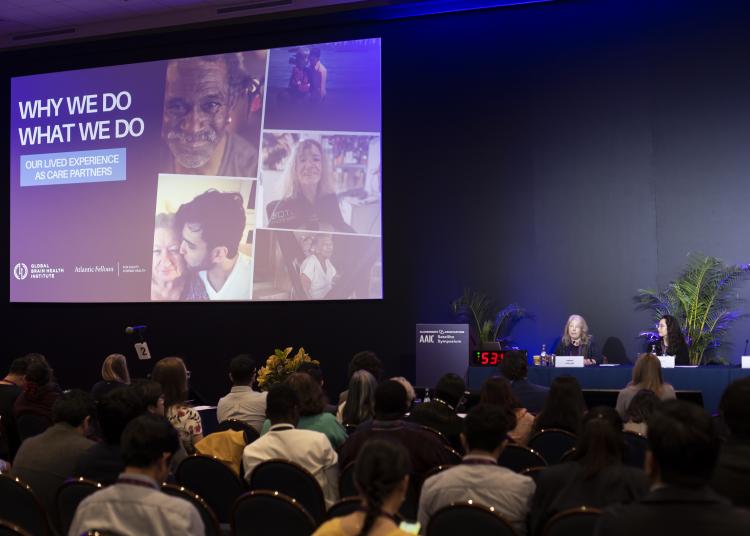
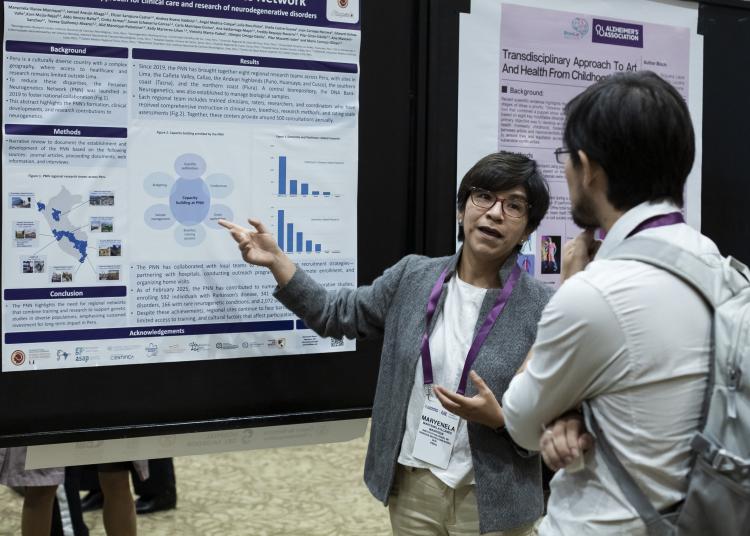
At the 2025 AAIC Satellite Symposium in Lima, Atlantic Fellows shared diverse approaches to advancing brain health. Left: Sarah Cullum and Sonia Sanchez moderated a panel centering the lived experience of care partners. Right: Maryenela Llanes-Manrique presented research on expanding access to dementia care and training through regional networks in Peru. Photo credit: Mario Colón
Centering Latin American Voices and Stories
“This event is a powerful opportunity to elevate the voices of Latin American researchers and practitioners,” said geriatrician Marcela Beatriz Mar Meza of the Instituto Peruano de Neurociencias and an Atlantic Fellow, and a member of the symposium’s scientific program committee. “By connecting science with the lived realities of our communities, we can foster solutions that are not only innovative but truly inclusive and responsive to local needs.”
Complementing the scientific program was a moving photo exhibition by Peruvian photographer and Atlantic Fellow Alex Kornhuber. His work documented the lived realities of older adults across diverse Peruvian communities, inviting reflection on aging, caregiving, and social inequality. Themes of resilience, wisdom, and vulnerability emerged through portraits like Juana, a deaf and blind woman navigating life in the remote jungle, and Cirilo, a 100-year-old weaver passing down his craft. The images captured the strength and complexity of aging with dignity amid challenging environments.
Building Regional Capacity and Collective Action
Surrounding the symposium, GBHI hosted its Annual Conference from May 11–13 and 16. The gathering provided Atlantic Fellows, alumni, faculty, and partners with a platform to strengthen global networks, share emerging research, and build leadership skills across disciplines. The conference theme—Rooted in Community, Growing Global Impact—emphasized the power of collaboration and equity-centered approaches in advancing brain health.
A highlight of the week was a community event at Hospital Víctor Larco Herrera, where international experts, caregivers, and community advocates joined for a public panel discussion focused on frontotemporal dementia. Titled “Bridging Neurology, Psychiatry, and Art in Diagnosis and Holistic Care,” the panel emphasized culturally informed care, early diagnosis, and creative engagement to reduce stigma and improve support for people affected by dementia.
The conference also included a working session on Peru's national dementia plan in Peru, hosted in collaboration with IMPACT Salud—an interdisciplinary initiative bringing together researchers, policymakers, and community leaders to promote brain health equity. The week concluded with a convening of ReDLat (the Latin American and Caribbean Consortium on Dementia), a collaborative network working to reduce dementia-related disparities across the region through data harmonization, regional training, and culturally relevant research.
More information about the AAIC Satellite Symposium and the GBHI Annual Conference, including recordings and resources, is alz.org/satellite and gbhi.org/lima.
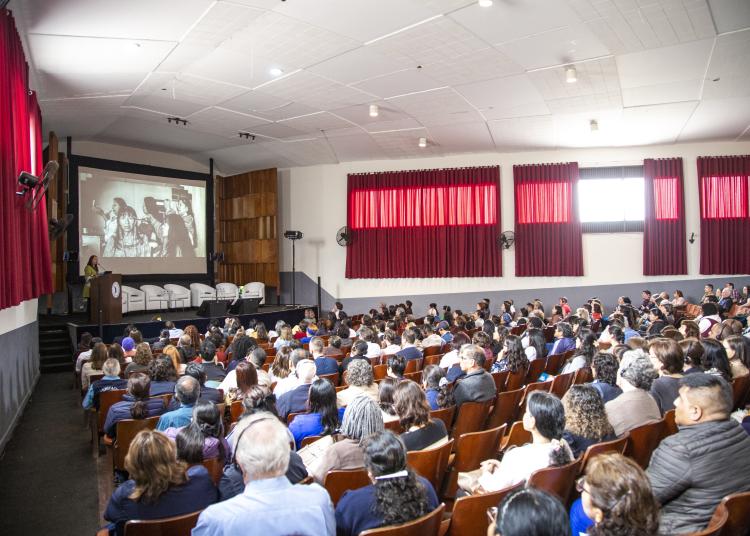
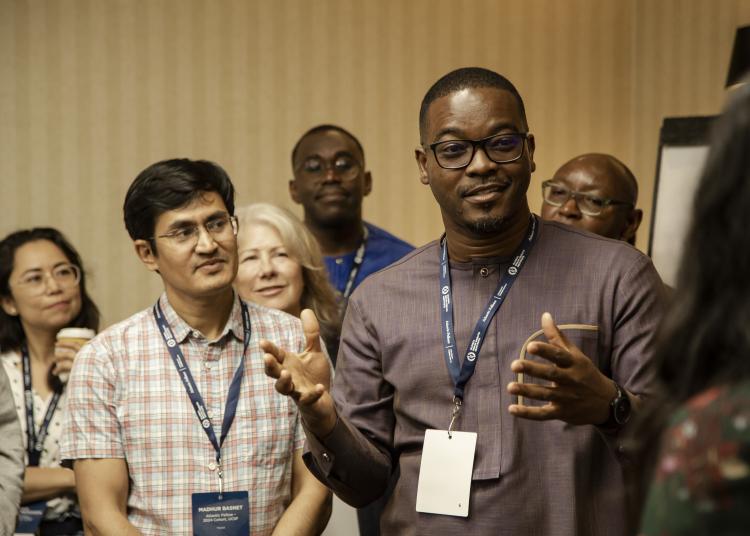
At the 2025 GBHI Annual Conference in Lima, Peru, Atlantic Fellows highlighted the power of community, creativity, and collaboration in advancing brain health. Left: Susana Lay speaks at a public event on frontotemporal dementia at Hospital Víctor Larco Herrera, exploring the role of art, memory, and culturally informed care. Right: Kwaku Sarfo Manu shares insights during a small group discussion focused on global leadership and equity in brain health. Photo credit: Mario Colón

